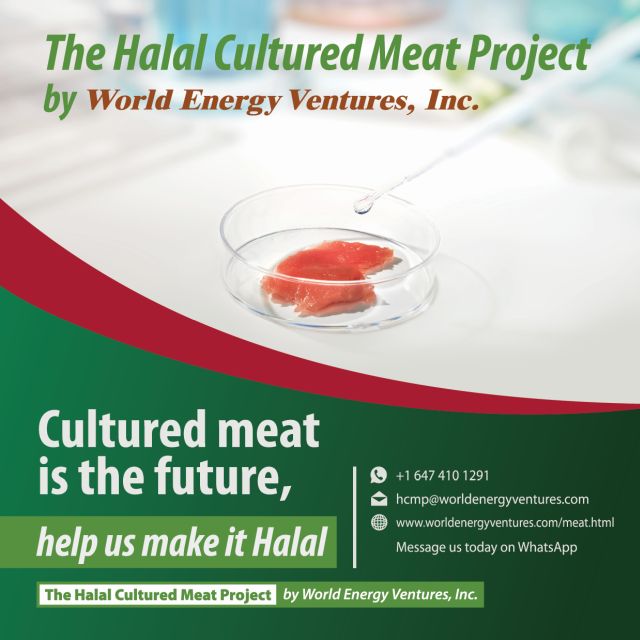
Soon enough, lab-grown burgers, meatballs, and steak chips will start appearing on store shelves and in restaurants. The mission of The Halal Cultured Meat Project is to make Halal cultured meat and meat products available to the Muslim consumer.
INTRODUCTION
The aim of The Halal Cultured Meat Project is to make halal cultured meat and meat options readily available from the get-go. With over 30 companies established, and more to come, possibility of most mainstream meat being made in culturing laboratories is a very real possibility. In a market beginning to catch wind now, the objective of The Halal Cultured Meat Project is to be one of the founders of the halal cultured meat market.
WHAT IS CULTURED MEAT?
Cultured meat is meat grown in a bio-lab. The production of cultured meat consists of 3 phases: the collection and selection of cells; then comes the growth period; and finally, a procedure known as "scaffolding".
The first step in growing cultured meat is to identify the cells that are to be cultured. The second step is to transfer the cells into a growth medium, where the chosen cells are fed nutrients and kept in an ideal environment for the fastest proliferation process possible. Finally, the third phase to this process is known as “scaffolding”, where the grown cells are organized at the microscopic level to form muscle tissue - resulting in a three-dimensional structure that resembles traditional meat.
Cultured meat is a promising product that utilizes state-of-the-art biotechnology and has the potential to change the world. A type of meat that is sustainable, environmentally-friendly, as well as animal-friendly. As with many other innovations, it is only natural for lab-grown meat to spur ethical, philosophical, and religious discussions.
HALAL CULTURED MEAT
One of these discussions is whether cultured meat is halal or not – a point of concern for the 1.8 billion Muslims around the globe. The Halal Meat Project's endeavor is to bring halal cultured meat and meat products to all Muslims. Today’s cultured meat is produced from stem cells taken from live animals. These cells are grown in a medium which is made of fetal bovine serum. Neither of these methods is in accordance with Islamic dietary guidelines as determined by Department of Fiqh and Usul, Academy of Islamic Studies, University of Malaya, Jalan Universiti, based in Kuala Lumpur, Malaysia. Development of Cultured Meat has opened up a new chapter in biotechnology that has yet to be discussed by classical jurists, scholars, Muftis, and Fuqaha’. The Halal Meat Project is working alongside these religious intellectuals, and under their guidance it will ensure that every stage of the process of culturing meat will comply with, and be in conformity with Islamic dietary guidelines to develop a Halal version of the future meat and meat products.
As of now, the most feasible path to achieving the halal status of cultured meat is to source the starter cells from Halal Zabiha animals, and to ascertain the purity of the culture medium, nutrients, and the bio-environment used for the proliferation of the cells and production of the muscle tissue.
EXPECTED BY 2021
Lab-grown meats were expected to emerge by the 1980s. Winston Churchill predicted that a time would come when all of humanity would consume cultured meat, resolving majority of the hunger crises in the world. Today, the possibility of a mainly cultured meat world grows closer by every passing minute. Cultured meat products are expected to hit grocery shelves as soon as 2021.
ENVIRONMENTAL BENEFITS
Livestock farming is responsible for nearly 18% of all greenhouse gas emissions. With the numbers showing a 73% spike in demand for meat products in 2050 - a need has come for a responsible solution for the preservation of our environment. 46% of crops are being grown only to feed livestock, while 70% of arable land is being used to build barns and other homes for livestock. It is not surprising that this type of farming is draining our resources faster than they can be regenerated.
Not only does cultured meat benefit the environment, but it benefits our own health. Cells from a single cow can be cultured into 175 million quarter-pounders - whereas traditional farming methods would need 440,000 cows for that same amount of meat. Efficiency is only one of the many perks culturing meat brings with it. Today, giving antibiotics to livestock has become disturbingly commonplace. Studies continue to prove the grossly damaging effects of this practice on human immune systems. As the culturing process is completely sterile and sanitary, antibiotics have simply become unnecessary. Among other health benefits, fat and cholesterol levels may be regulated in cultured meat, which would allow people with cholesterol issues to safely eat red meat.
LOOKING AHEAD
For all of these reasons, a Halal option is necessary for the billions of Muslims around the world. Our purpose is to make Halal cultured meat an accessible commodity for all of humanity, with our fellow Muslim brothers and sisters being our top priority. As this bio-technology field has just begun to gain momentum, now is the right time for us to work to achieve a Halal version of cultured meat and cultured meat products, so that Halal cultured meat isn’t a specialty, but a widely accessible food for the Muslim population.
Imagine a world where there’s no fear of presence of prohibited substances in cultured meat products available at grocery stores, or from the local fried chicken drive-thru, or on the menu of a fine dining restaurant.
Imagine comfort and confidence; imagine The Halal Cultured Meat Project!
Text or WhatsAPP
"halal" to +1 647-410-1291 today to help us make this a reality!

